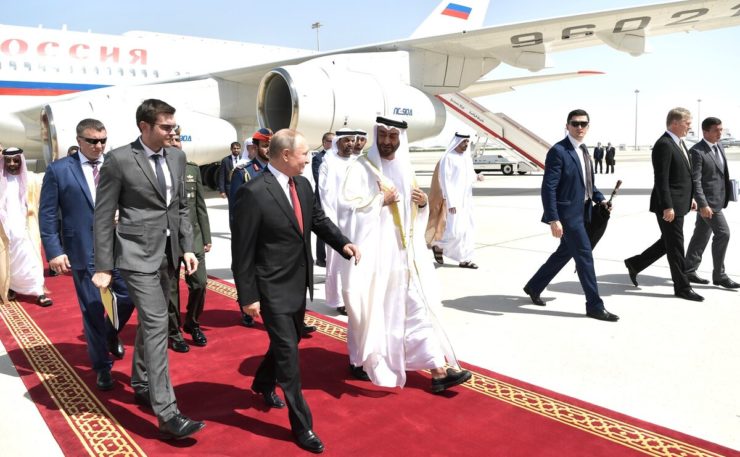
“Putin’s visit to Saudi Arabia and the UAE at the center of global attention,” “Putin in Saudi Arabia and the UAE: the world is changing,” “Why did Putin visit the Gulf?”. These and other headlines reflect the reaction in the Middle East media space to the visit of Russian President Vladimir Putin to the two Persian Gulf countries on December 6 this year.
The general tone of the ongoing responses is as follows: the sides are interested in expanding bilateral ties and mutual understanding on the situation in the region and other world problems, especially energy issues. The course of relations between these Gulf states and Russia has shown their stability, with the West failing to drive a wedge between them by using the Ukraine crisis to do so, the authors agree.
Arab experts recall that the UAE is the largest trading partner and investor for Russia in the Arab world. Abu Dhabi provides about 80% of Arab investment in Russia and accounts for 90% of all Russian investment in the Arab region. The UAE is actively diversifying its economy, and Moscow is keen to encourage Russian investment in sectors such as real estate, infrastructure, technology and others.
The Kingdom of Saudi Arabia has the largest economy in the Arab world. It cooperates with Russia in a number of areas, Russia’s agricultural exports to this Arabian monarchy are growing dynamically, new areas and great potential for prospective cooperation between the two countries are opening up.
Russia, Saudi Arabia and the UAE are motivated to sail on the same wave on the sea of energy trade. As members of the OPEC+ group, they are committed to maintaining a price level that suits them but does not distort international markets. Experts emphasize the success of OPEC+ countries’ efforts to assert the stability of these oil markets, as well as the importance of their continuation for the benefit of producers and consumers and to support the global economy.
At the same time, they note that Putin’s tour to the region did not only have economics on its agenda. The timing of this trip in view of the “sensitive circumstances” due to the worsening situation in Palestine gives it more meaning than a mere “step to discuss bilateral relations.”
It carries goals and “signals” of geostrategic order to the West, confirming that Russia is still capable of influencing and re-mobilizing policies to defuse crises in the region, the Saudi portal Al-Ajal is convinced.
The palette of responses is broad and includes opinions noting Russia’s position on the Arab-Israeli conflict. It stands for a ceasefire in the Gaza Strip, for a return to the negotiation process. Moscow’s flexibility in dealing with opposing parties, such as Iran or Israel, gives it a role that is sorely lacking in Western countries, especially in the United States.
Through the lens of the Russian leader’s visit, the Kingdom perceives Russia as a major great power capable of shaping international policy, not just joining others in its implementation.
Its advanced vision of realities, its military successes and especially its modern weaponry have forced many powers, most notably the United States, to change their plans in the face of Moscow’s messages and actions in the arena of world politics, concludes the Saudi newspaper Asharq Al-Awsat.
For the Kingdom of Saudi Arabia and the United Arab Emirates, the reception of the Russian president under such tense circumstances appears to be a message to the West in general and Washington in particular. A Bahraini author sees it in the fact that the Arab world has begun to lose hope in the policies of the West and the US in particular, whether it is the Palestinian track or Israeli aggression against Palestinians in the Gaza Strip and the West Bank.
This is a sign that the Gulf States have begun to move towards balanced relations between the world’s major powers, including the Russian Federation, and this is certainly “in our Arab interests”…
Putin’s tour takes on particular significance in view of Russia’s chairmanship of BRICS in 2024 amid its efforts to encourage the UAE and Saudi Arabia to join, an important development on the global geopolitical landscape, observers emphasize. The inclusion of these countries will not only expand their geopolitical influence but also strengthen their economic ties with emerging economies.
One of the goals that the Kremlin leader has achieved as a result of his visit is to clearly demonstrate the effectiveness of his foreign policy. This strengthens his position within Russia, for it says that the country has friends it can trust, and that the Middle East and the Persian Gulf are acting in concert with Russia, and Russia is watching with interest the accelerating course of events over there.
According to experts, Putin’s visit indicates Russia’s gradual return to the international arena despite attempts to isolate it. It illustrated the Russian leader’s confidence that the country can resist the desperate efforts of the US and Europe to shut Russia out of the world.
The general message of many media commentaries in the region is that the Russian leader’s visit represents an opportunity for Russia to expand its influence in the region and for the countries of the region to diversify their relations and alliances.
Russian experience is worth studying and adopting, says the Saudi newspaper, Al Okaz. The Russian Federation, having faced tremendous pressure after the end of the Cold War, has learned the lessons of the past, focused on the economy and paid attention to agriculture, especially after the imposition of Western sanctions.
Russia’s experience is in demand for the region and the Islamic world. It is about the willingness to resist Western hegemony and beware of its tricks and gimmicks. The West recognizes nothing but the language of force and its interests.
Yury Zinin, senior researcher at the Center for Middle Eastern and African Studies of the Moscow State Institute of International Relations (MGIMO) of the Ministry of Foreign Affairs, exclusively for the online magazine “New Eastern Outlook”.
